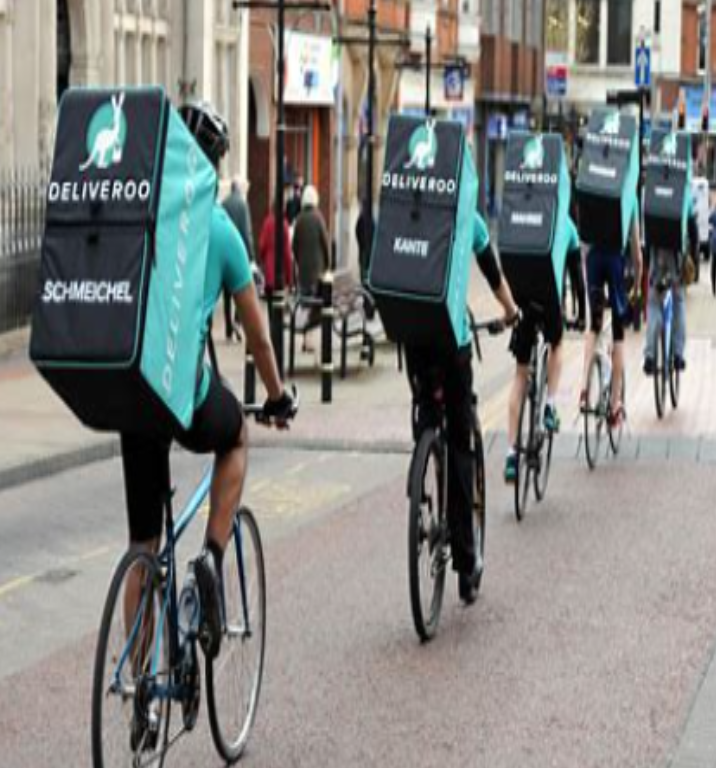Independent Workers Union of Great Britain v Central Arbitration Committee & Anor [2023] UKSC 43 (21 November 2023)
Citation: Independent Workers Union of Great Britain v Central Arbitration Committee & Anor [2023] UKSC 43 (21 November 2023)
Rule of thumb: Stare-decisis: Are Deliveroo workers employees? Can independent contractors take collective industrial action? No and No. Deliver delivery drivers are not employees – they are self-employed independent contractors with key factors being that they can pick their own hours & send substitutes. This means that they are not allowed to form trade unions & bargain collectively (i.e. go on random strikes or delay food arrivals). Independent contractors like Deliveroo drivers are not allowed to take collective industrial & go on strike/delay food deliveries.
Background facts: The facts of this case were that the delivery drivers of fast-food were not happy with their working conditions at Deliveroo. Many of these workers formed a workers’ union called ‘The Independent Workers Union of Great Britain’ (TWIUG). TIWUG then sought to begin negotiating in collective bargaining with Deliveroo as well as other fast-food restaurants & associations of fast-food restaurants for improved working conditions, with the potential for widespread industrial action there if these negotiations failed.
The fast-food restaurants & associations of fast-food restaurants refused to negotiate with TIWUG and of course informed them of their right to seek damages for any interferences with contract or breach of contract respectively or indeed sack workers for major breaches of contract.




Parties argued: TIWUG argued that as the workers were employees they were allowed to form unions to enter into collective bargaining agreements, with the right for TIWUG to take industrial action if their demands were not being met.
Deliveroo argued that the workers were not employees but independent contractors, who did not have collective bargaining & industrial actions rights. Deliveroo argued that the workers were allowed to pick their own hours & send a replacement so the mutuality test was not met.
Court held: The Court upheld the arguments of Deliveroo – the key word in this Judgment was ‘substitution’. The drivers delivering fast-food are not employees – the substitution factors of (i) ‘pick your own hours’ & (ii) ‘send a replacement’ lie at the heart of the mutuality test and these were not met, so the fast-food drivers were indeed independent contractors & not employees – the Court expressly affirmed that there was ‘no notion’ of these workers meeting the employee mutuality test in these circumstances. The Court therefore held that there was no right for these workers to engage in collective bargaining (negotiate as a group & go on strike or walk-out if demands not met).

Ratio-decidendi:
71. ‘This, of itself, is sufficient to determine Issue 1. However, there are present in the relationship between Deliveroo and the Riders further indicators, as identified in ILO Recommendation No 198, which, taken in conjunction with the right of substitution, provide further strong support for this conclusion. The following were identified by Mr Jeans on behalf of Deliveroo and we agree that these are relevant factors:
(1) Riders do not have to carry out any deliveries at all. (2) Riders do not work within specific working hours. They operate if and when they choose. (3) Their place of work is not specified or agreed. They operate where they choose within the CKT zone. (4) Their activity is not of a particular duration, nor does it have a certain continuity. Riders start and stop when they choose. (5) They are not required to be available. (6) As regards tools, materials and machinery, all equipment is at the Riders’ expense. Riders use their own cycles and mobile phones. (7) There is no periodic payment. Remuneration depends on whether Riders choose to make deliveries and how many they make. (8) Deliveries are not necessarily or typically their sole or principal source of income. Even where they are, a goodly proportion may earn from Deliveroo’s direct competitors, potentially by undertaking the competitor’s work in preference. (9) There is no payment in kind such as food, lodging and transport. (10) There is no entitlement to weekly rest and annual holidays. (11) There is no reimbursement for the cost of travel. (12) There is no protection from financial risk for Riders, whether in the form of insurance, guaranteed earnings or otherwise.
72. Riders are thus free to reject offers of work, to make themselves unavailable and to undertake work for competitors. Once again, these features are fundamentally inconsistent with any notion of an employment relationship.
73. We conclude, therefore, that the Riders do not fall within the scope of an employment relationship within article 11. The rights conferred by that article to join and to be represented by a trade union are not conferred on the Riders’.
Lord Lloyd-Jones
Warning: This is not professional legal advice. This is not professional legal education advice. Please obtain professional guidance before embarking on any legal course of action. This is just an interpretation of a Judgment by persons of legal insight & varying levels of legal specialism, experience & expertise. Please read the Judgment yourself and form your own interpretation of it with professional assistance.

